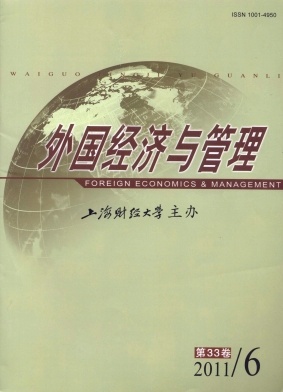国外议题营销研究进展述评
外国经济与管理 2011 年 第 33 卷第 06 期, 页码:50 - 58
摘要
参考文献
摘要
议题营销是一种向上影响途径,中层管理者能够通过议题营销影响高层管理者对某些议题的注意力和态度,从而影响组织的战略议程。本文首先对议题营销的概念和意义进行了分析,然后从议题营销意愿、议题营销发动、议题营销效果几个方面对现有的文献进行了梳理和评价,在此基础上构建了议题营销整合模型,并指出了未来该领域有价值的研究方向。
[1]Pfeffer,J.Management as symbolic action:The creation and maintenance of organization paradigm[A].in Cummings,L L,andStaw,B M(Eds.).Advances in organizational behavior[C].Greenwich,CT:JAI Press,1981,3:1-52.
[2]Dutton,J E,and Duncan,R B.Theinfluence of the strategic planning process on strategic change[J].Strategic Management Jour-nal,1987,8(2):103-116.
[3]Ansoff,HI.Strategic issue management[J].Strategic Management Journal,1980,1(2):131-148.
[4]Dutton,J E,and Ashford,S J.Sellingissues to top management[J].Academy of Management Review,1993,18(3):397-428.
[5]Dutton,J E,Ashford,S J,O’Neill,R M,and Lawrence,K A.That matter:Issue selling and organizational change[J].Academy ofManagement Journal,2001,44(4):716-736.
[6]Wooldridge,B,and Floyd,S W.The strategy process,middle management,and organizational performance[J].Strategic Manage-ment Journal,1990,11(3):231-241.
[7]Ashford,S J,Rothbard,N P,Piderit,S K,and Dutton,J E.Out on ali mb:The role of context andi mpression management inissueselling[J].Administrative Science Quarterly,1998,43(1):23-57.
[8]Farmer,S M,John,M M,Fedor,D B,and Godman,J S.Putting upwardinfluence strategiesin context[J].Journal of OrganizationBehavior,1997,18(7):17-42.
[9]Feldman,MS.Resources in emerging structures and processes of change[J].Organization Science,2004,15(3):295-309.
[10]Howard-Grenville,J A.Developing issue-selling effectiveness over ti me:Issue selling as resourcing[J].Organization Science,2007,18(4):560-577.
[11]Ashford,S J,and Barton,M A.Identity-basedissue selling[A].in Bartel,C A,Blader,S L,and Wrzesniewski,A(Eds.).Identityand the modern organization[C].Mahwah NJ:Lawrence Erlbaum Associates,Inc.,2007:223-244.
[12]Dutton,J E,Ashford,S J,and O’Neill,R M.Reading the wind:How middle managers assess the context for sellingissues to topmanager[J].Strategic Management Journal,1997,18(5):407-423.
[13]Dutton,J E,Ashford,S J,Lawrence,K,and Miner-Rubino,K.Red light,green light:Making sense of the organizational contextfor issue selling[J].Organization Science,2002,13(4):355-369.
[14]Ling,Y,Steven,WF,and David,C B.Towards a model of issue-selling by subsidiary managers in multinational organizations[J].Journal of International Business Studies,2005,36(6):637-654.
[15]Gammelgaard,J.Issue selling and bargaining power in intrafirmcompetition:The differentiating i mpact of the subsidiary man-agement composition[J].Competence&Change,2009,13(3):214-228.
[16]Fu,P P,and Yukl,G.Perceived effectiveness of influence tacticsin the United States and China[J].Leadership Quarterly,2000,11(2):251-266.
[17]Luo,Y.Toward co-operation within a multinational enterprise:Aperspective fromsubsidiaries[J].Journal of World Business,2005,40(3):71-90.
[18]Shenkar,O.Cultural distance revisited:Towards a more rigorous conceptualization and measurement of cultural differences[J].Journal of International Business Studies,2001,32(3):1-17.
[19]Sully de Luque,MF,and Sommer,S M.The i mpact of culture on feedback-seeking behavior:An integrated model and proposi-tions[J].Academy of Management Review,2000,25(4):829-849.
[20]Hoff man,A.Institutional evolution and change:Environmentalismand the U.S.chemical industry[J].Academy of ManagementJournal,1999,42(4):351-371.
[2]Dutton,J E,and Duncan,R B.Theinfluence of the strategic planning process on strategic change[J].Strategic Management Jour-nal,1987,8(2):103-116.
[3]Ansoff,HI.Strategic issue management[J].Strategic Management Journal,1980,1(2):131-148.
[4]Dutton,J E,and Ashford,S J.Sellingissues to top management[J].Academy of Management Review,1993,18(3):397-428.
[5]Dutton,J E,Ashford,S J,O’Neill,R M,and Lawrence,K A.That matter:Issue selling and organizational change[J].Academy ofManagement Journal,2001,44(4):716-736.
[6]Wooldridge,B,and Floyd,S W.The strategy process,middle management,and organizational performance[J].Strategic Manage-ment Journal,1990,11(3):231-241.
[7]Ashford,S J,Rothbard,N P,Piderit,S K,and Dutton,J E.Out on ali mb:The role of context andi mpression management inissueselling[J].Administrative Science Quarterly,1998,43(1):23-57.
[8]Farmer,S M,John,M M,Fedor,D B,and Godman,J S.Putting upwardinfluence strategiesin context[J].Journal of OrganizationBehavior,1997,18(7):17-42.
[9]Feldman,MS.Resources in emerging structures and processes of change[J].Organization Science,2004,15(3):295-309.
[10]Howard-Grenville,J A.Developing issue-selling effectiveness over ti me:Issue selling as resourcing[J].Organization Science,2007,18(4):560-577.
[11]Ashford,S J,and Barton,M A.Identity-basedissue selling[A].in Bartel,C A,Blader,S L,and Wrzesniewski,A(Eds.).Identityand the modern organization[C].Mahwah NJ:Lawrence Erlbaum Associates,Inc.,2007:223-244.
[12]Dutton,J E,Ashford,S J,and O’Neill,R M.Reading the wind:How middle managers assess the context for sellingissues to topmanager[J].Strategic Management Journal,1997,18(5):407-423.
[13]Dutton,J E,Ashford,S J,Lawrence,K,and Miner-Rubino,K.Red light,green light:Making sense of the organizational contextfor issue selling[J].Organization Science,2002,13(4):355-369.
[14]Ling,Y,Steven,WF,and David,C B.Towards a model of issue-selling by subsidiary managers in multinational organizations[J].Journal of International Business Studies,2005,36(6):637-654.
[15]Gammelgaard,J.Issue selling and bargaining power in intrafirmcompetition:The differentiating i mpact of the subsidiary man-agement composition[J].Competence&Change,2009,13(3):214-228.
[16]Fu,P P,and Yukl,G.Perceived effectiveness of influence tacticsin the United States and China[J].Leadership Quarterly,2000,11(2):251-266.
[17]Luo,Y.Toward co-operation within a multinational enterprise:Aperspective fromsubsidiaries[J].Journal of World Business,2005,40(3):71-90.
[18]Shenkar,O.Cultural distance revisited:Towards a more rigorous conceptualization and measurement of cultural differences[J].Journal of International Business Studies,2001,32(3):1-17.
[19]Sully de Luque,MF,and Sommer,S M.The i mpact of culture on feedback-seeking behavior:An integrated model and proposi-tions[J].Academy of Management Review,2000,25(4):829-849.
[20]Hoff man,A.Institutional evolution and change:Environmentalismand the U.S.chemical industry[J].Academy of ManagementJournal,1999,42(4):351-371.
引用本文
谭凌波, 谢晋宇, 李辉, 等. 国外议题营销研究进展述评[J]. 外国经济与管理, 2011, 33(6): 50–58.
导出参考文献,格式为:
上一篇:消费者渠道迁徙行为研究评介与展望





 6862
6862  582
582

